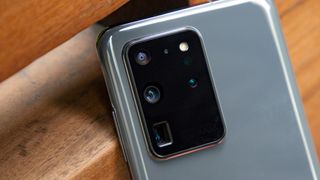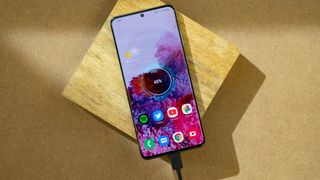Samsung Galaxy Note 20 Ultra vs Galaxy S20 Ultra: What should you buy?
Here's how the Note 20 Ultra and Galaxy S20 Ultra compare

Update: We recommend that most phone buyers wait for the Samsung Galaxy S22 Ultra, which is expected to launch in February and include the latest Snapdragon 8 Gen 1 chip, an integrated S Pen and improved camera.
Original article: Samsung has two ultra-premium, big-screen beasts to choose from in the Samsung Galaxy Note 20 Ultra and Galaxy S20 Ultra. And while both sport 6.9-inch displays and top-end specs, there are plenty of differences between these phablets, from the price and specs to special features.
In a nutshell, the Note 20 Ultra is optimized for productivity because of its S Pen, while the S20 Ultra is a better bet for entertainment. But both big phones are designed for work and play.
- Samsung Galaxy Note 20 Ultra review: Pros and cons
- See our full Samsung Galaxy S20 Ultra review
- Samsung Galaxy Note 20 Ultra vs. Galaxy Note 10 Plus: What's different?
If you're looking for Samsung's latest and greatest phones, the Galaxy S21 Ultra is a better phone to compare to the Note 20 Ultra because the former offers S Pen support. But this Note 20 Ultra vs Galaxy S20 Ultra guide well help you decide which one is right for you between these two phones.
Galaxy Note 20 Ultra vs Galaxy S20 Ultra specs
| Row 0 - Cell 0 | Galaxy Note 20 Ultra | Galaxy S20 Ultra |
| Price | $1,299, $1,449 | $1,399, $1,599 |
| Screen size | 6.9 inches (3096 x 1444) | 6.9 inches (3200 x 1440) |
| Screen refresh rate | 120Hz dynamic | 120Hz |
| CPU | Snapdragon 865 Plus/Exynos 990 | Snapdragon 865 |
| RAM | 12GB | 12GB |
| Storage | 128GB, 512GB | 128GB, 512GB |
| Rear cameras | 108MP main, 12MP telephoto, 12MP ultrawide, laser focus sensor | 108MP main, 48MP telephoto, 12MP ultra-wide, VGA ToF |
| Zoom | 5x optical, 50x digital | 4x optical, 100x Space Zoom |
| Front camera | 10MP | 40MP |
| Battery size | 4,500 mAh | 5,000 mAh |
| Charging | 25W | 25W, 45W (optional) |
| 5G? | Yes | Yes |
| Size | 6.48 x 3.04 x 0.32 inches | 6.6 x 2.7 x 0.34 inches |
| Weight | 7.33 ounces | 7.77 ounces |
Galaxy Note 20 Ultra vs Galaxy S20 Ultra: Price
The Samsung Galaxy Note 20 Ultra starts at $1,299 for 128GB of storage and goes up to $1,449 for 512GB.
The Galaxy S20 Ultra is the pricier of these two handsets. It starts at $1,399 for 128GB model and goes up to $1,599 for the 512GB version.
We highly recommend looking for the best Galaxy Note 20 deals and Galaxy S20 deals, as many retailers and carriers are offering big discounts.
Sign up to get the BEST of Tom’s Guide direct to your inbox.
Upgrade your life with a daily dose of the biggest tech news, lifestyle hacks and our curated analysis. Be the first to know about cutting-edge gadgets and the hottest deals.
Galaxy Note 20 Ultra vs Galaxy S20 Ultra: Design

The Galaxy Note 20 Ultra delivers a huge 6.9-inch screen in a smaller package than the S20 Ultra. The Note 20 Ultra measures 6.48 x 3.04 x 0.32 inches and weighs 7.33 ounces, compared to 6.6 x 2.7 x 0.34 inches and 7.77 ounces for the S20 Ultra. Our guess is that the Space Zoom camera on the S20 Ultra adds to its heft.

The Note 20 Ultra is a sleek phablet with a professional vibe, and it's available in three colors: Mystic Bronze, Mystic White and Mystic Black. The S20 Ultra comes in just to colors: Cosmic Gray and Cosmic Black.
Galaxy Note 20 Ultra vs Galaxy S20 Ultra: Display

The Galaxy Note 20 Ultra and Galaxy S20 Ultra both have 6.9-inch displays with a 120Hz refresh rate, but the Note 20 Ultra has an advantage. Because the panel is dynamic on the Note 20 Ultra, it's smart enough to adjust its refresh rate on the fly based on the content that's on screen. With the S20 Ultra, you have to manually toggle between 60Hz and 120Hz.

Otherwise, both OLED displays are gorgeous, and the S20 Ultra's screen is a little bit sharper at 3200 x 1440 pixels versus 3096 x 1444 for the Note 20 Ultra. You can also expect a wide color range from both phones and ultra-wide viewing angles.
Both panels are quite bright, as they each hit 662 nits using our light meter and are easy to see outdoors (if you put adaptive brightness on).
Galaxy Note 20 Ultra vs Galaxy S20 Ultra: Cameras

The Note 20 Ultra takes a slightly different approach to its cameras than the S20 Ultra. While it offers the same 108MP main camera, it complements it with a laser auto focus sensor that results in faster focusing, especially when shooting video. The Galaxy S20 Ultra lacks this feature.

On the other hand, the Galaxy S20 Ultra has a bigger Space Zoom that goes up to 100x, compared to a 50x digital zoom for the Note 20 Ultra. Still, the Note 20 Ultra's 5x optical zoom is better than the 4x optical zoom on the S20 Ultra.
Up front, the S20 Ultra has the sharper selfie camera at 40MP, compared to 10MP for the Note 20 Ultra.
Galaxy Note 20 Ultra vs Galaxy S20 Ultra: S Pen

The biggest difference between the Galaxy Note 20 Ultra and S20 Ultra is that the Note features an S Pen. This stylus lets you take notes, draw and sketch on the go, and Samsung has included some new features this time around to boost the productivity of this phablet.
The new Samsung Notes app automatically syncs your notes to the cloud, so you can access them from any device. And if you're taking voice memos, your scribbles will be in sync with your recordings, which is convenient for meetings or classes. Plus, the S Pen in the Note 20 Ultra now supports a bunch of new air gestures for things like returning to the home screen or quickly taking screen shots.
Galaxy Note 20 Ultra vs Galaxy S20 Ultra: Performance

The Galaxy Note 20 Ultra has a slight edge here, thanks to the new Snapdragon 865 Plus chip. This provides a clock speed bump over 3 GHz while improving graphics performance by 10%. It's not a huge leap, but power users will probably appreciate the extra oomph.
On Geekbench 5, which measures overall performance, the Galaxy Note 20 Ultra hit a mult-core score of 3,294, compared to 3,076 for the S20 Ultra. On the GFXBench graphics test, the Galaxy Note 20 Ultra scored 1,455 frames on the Aztec Ruins (High Tier) off-screen benchmark, compared to 1,319 for the S20 Ultra.
Both the Note 20 Ultra and S20 Ultra come with a robust 12GB of RAM, as well as 128GB of storage standard. You can upgrade to 512GB if you're willing to pay more. And both phones let you expand the storage via a microSD card.
Galaxy Note 20 Ultra vs Galaxy S20 Ultra: Battery life

The Samsung Galaxy S20 Ultra has an edge over the Galaxy Note 20 on battery capacity, as the former phablet packs a 5,000 mAh battery into its chassis. The Note 20 Ultra has a 4,500 mAh battery.
On our web surfing battery test, the Galaxy S20 Ultra lasted 11 hours and 58 minutes in 120Hz mode and 9:13 in 60Hz mode. The Note 20 Ultra lasted a shorter 10 hours and 26 minutes and 7:59, respectively, at 60Hz and 120Hz.
In terms of charging, the Galaxy S20 Ultra and Note 20 Ultra both support 25W fast charging, but only the S20 Ultra supports even faster 45W charging as an option.
Galaxy Note 20 Ultra vs Galaxy S20 Ultra: Verdict
If I were spending my own money, I would buy the Galaxy Note 20 Ultra over the Galaxy S20 Ultra. For $100 less, you get a dynamic 120Hz display, a laser auto focus sensor for the camera, and a smaller than lighter design. Even if you don't really need the S Pen, the Note 20 Ultra is the better phone.
The Galaxy S20 Ultra has a couple of things going for it with its more powerful Space Zoom and especially beefier battery. And that's really the only reason to opt for the S20 Ultra: longer endurance.
Overall, the newer Samsung Galaxy S21 Ultra is truly the phone to get because it offers better cameras than the Note 20 Ultra. But if you want an S Pen built in, the Note 20 Ultra is my choice.
- More: Galaxy Note 20 vs Galaxy Note 9: Should you upgrade?
Mark Spoonauer is the global editor in chief of Tom's Guide and has covered technology for over 20 years. In addition to overseeing the direction of Tom's Guide, Mark specializes in covering all things mobile, having reviewed dozens of smartphones and other gadgets. He has spoken at key industry events and appears regularly on TV to discuss the latest trends, including Cheddar, Fox Business and other outlets. Mark was previously editor in chief of Laptop Mag, and his work has appeared in Wired, Popular Science and Inc. Follow him on Twitter at @mspoonauer.
Most Popular


